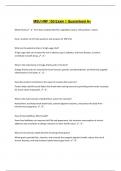MSU HNF 150 Exam 1 Guaranteed A+
Whole Foods ✔️✔️form basic healthy diet (fish, vegetables, beans, milk products, meats)
Here’s another set of fresh questions and answers for HNF 150:
What are the potential risks of a high-sugar diet?
A high-sugar diet can increase the risk of obesity, type 2 diabetes, and heart disease, as well as
contribute to tooth decay. ✔️✔️
What is the importance of omega-6 fatty acids in the diet?
Omega-6 fatty acids are essential for brain function, growth, and development, and they help regulate
inflammation in the body. ✔️✔️
How does protein contribute to the repair of muscles after exercise?
Protein helps rebuild muscle fibers that break down during exercise by providing amino acids necessary
for tissue repair and growth. ✔️✔️
What is the main function of hydrochloric acid in the stomach?
Hydrochloric acid helps break down food, activate digestive enzymes, and protect the body from
harmful microorganisms. ✔️✔️
How do food additives affect health?
Some food additives can improve shelf life and appearance, but excessive consumption of certain
additives may contribute to allergic reactions or other health issues. ✔️✔️
What are the primary health benefits of eating whole grains?
Whole grains provide fiber, vitamins, and minerals that support digestive health, reduce the risk of
chronic diseases, and help maintain stable blood sugar levels. ✔️✔️
,What is the significance of eating a rainbow of fruits and vegetables?
Eating a variety of colorful fruits and vegetables ensures a broad intake of essential vitamins, minerals,
antioxidants, and fiber, which promote overall health. ✔️✔️
How does the body use glucose during physical activity?
During physical activity, glucose is broken down into energy to fuel muscles, particularly during high-
intensity exercise. ✔️✔️
Why are antioxidants important for the skin?
Antioxidants protect the skin from oxidative stress caused by UV rays and pollution, helping prevent
premature aging and skin damage. ✔️✔️
What are the main roles of the kidneys in nutrition?
The kidneys filter waste products from the blood, regulate electrolyte balance, and maintain proper fluid
levels in the body. ✔️✔️
How do phytonutrients benefit human health?
Phytonutrients, found in plant-based foods, have antioxidant and anti-inflammatory properties that may
help reduce the risk of chronic diseases like cancer and heart disease. ✔️✔️
What are the effects of overconsumption of protein supplements?
Excessive use of protein supplements can put strain on the kidneys, increase the risk of dehydration, and
may lead to nutrient imbalances. ✔️✔️
Why is a balanced intake of macronutrients important for health?
A balanced intake of carbohydrates, fats, and proteins ensures the body has sufficient energy, supports
bodily functions, and promotes overall health. ✔️✔️
What role does vitamin K play in the body?
, Vitamin K is essential for blood clotting and bone health, as it helps regulate calcium in the bones and
blood. ✔️✔️
How can probiotics improve gut health?
Probiotics help balance gut bacteria, which can improve digestion, enhance immune function, and
reduce inflammation. ✔️✔️
What are the signs of vitamin D deficiency?
Signs of vitamin D deficiency include fatigue, bone pain, muscle weakness, and an increased risk of
fractures. ✔️✔️
How does alcohol impact nutrient absorption?
Alcohol can interfere with the absorption of key nutrients, particularly those involved in liver function,
such as vitamin B12 and folate. ✔️✔️
What are the key differences between plant-based and animal-based protein sources?
Plant-based proteins typically lack one or more essential amino acids but are high in fiber, while animal-
based proteins provide all essential amino acids and are rich in certain vitamins and minerals. ✔️✔️
Why is zinc important for immune function?
Zinc is essential for the development and function of immune cells, and it helps the body fight infections
and heal wounds. ✔️✔️
How does calcium support muscle function?
Calcium is required for muscle contraction by enabling the interaction between muscle fibers, ensuring
proper muscle movement and strength. ✔️✔️
What are the benefits of reducing sodium intake in the diet?
Reducing sodium intake can help lower blood pressure, reduce the risk of heart disease, and improve
overall kidney function. ✔️✔️




